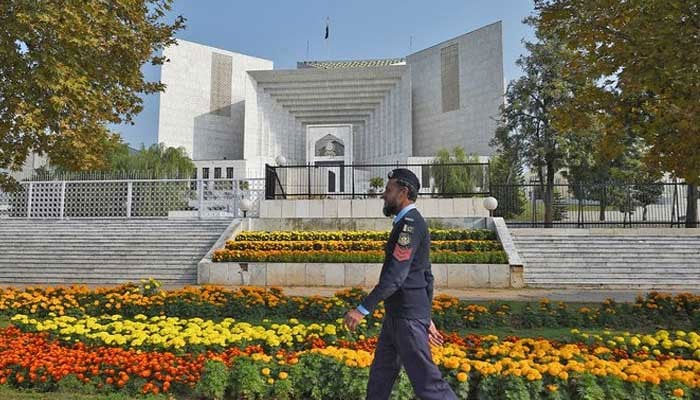Public sector universities must abide by their laws: SC
A three-member bench of the apex court, headed by Chief Justice Qazi Faez Isa issued a written order of July 11 hearing in a petition field by APUBTA through its president
ISLAMABAD: The Supreme Court has directed that public sector universities must not leave vacant important positions of vice-chancellors, presidents, vice presidents, registrars, heads of faculties and departments, controller of examination and director finance as in doing so they contravene the applicable laws.
A three-member bench of the apex court, headed by Chief Justice Qazi Faez Isa and comprising Justice Naeem Akhtar Afghan and Justice Aqeel Ahmed Abbasi, issued a written order of July 11 hearing in a petition field by all Public Universities BPS Teachers Association (APUBTA) through its president.
The petitioner had made the Federation of Pakistan through the federal education secretary and others as respondents.
The court noted down in its written order that the Additional Attorney-General (AAG) submitted report on behalf of the Ministry for Federal Education and Professional Training. The report mentions that there are only 12 universities under the ministry’s purview,
The report submitted on behalf of the Sindh government states that seven universities are working without a regular vice chancellor and further stated that that several universities do not hold the prescribed meetings of the statutory bodies, says the written order.
It further says that according to the report many tenured positions in these universities have been filled-in on temporary basis, which does not appear to conform to the law. The court directed the vice-chancellors of these universities and Sindh Higher Education Commission secretary to submit an explanation in writing within 14 days of receipt of the order why the applicable law continues to be violated. The court further sought details of each university with regard to the abovementioned matters.
“We are informed that the HEC has prescribed an ideal ratio of academic to non-academic staff to be 1:1.5, which nearly all universities are failing to abide by in that the non-academic staff far exceeds the said ratio,” says the order, adding that this appears to be one of the reasons for the financial problems being faced by the universities.
The court directed the federation, provinces and the Islamabad Capital Territory to submit whether directions have been issued to ensure that the universities shall restrict/ stop further employment of non-academic staff. The court held that the public sector universities must comply with their respective laws, and if those in charge of them are disregarding the same for no justifiable reason, then they must demonstrate that they are still competent to hold their respective positions. The court directed that the laws governing these universities require that the meetings of syndicates, senates, boards of governors and boards of trustees, as applicable, must be periodically held.
The court further directed that the universities must not leave vacant important positions of vice-chancellors, presidents, vice presidents, registrars, heads of faculties and departments, controller of examination and director finance as in doing so they contravene the applicable laws.
-
 Fukushima Decommissioning: Japan Deploys Snake-like Robot To Remove Nuclear Debris
Fukushima Decommissioning: Japan Deploys Snake-like Robot To Remove Nuclear Debris -
 Brenda Song Turns Macaulay Culkin's 'Home Alone' Into 'terrible' Lesson: 'Children Have To Be A Little Scared'
Brenda Song Turns Macaulay Culkin's 'Home Alone' Into 'terrible' Lesson: 'Children Have To Be A Little Scared' -
 MrBeast Vows To Book Only Starlink-equipped Flights As Global Airline Adoption Surges
MrBeast Vows To Book Only Starlink-equipped Flights As Global Airline Adoption Surges -
 Kim Jong Un Says North Korea Ready To ‘get Along’ With US But Sets Key Condition
Kim Jong Un Says North Korea Ready To ‘get Along’ With US But Sets Key Condition -
 Andrew Fears What Comes Next As Jeffrey Epstein Scandal Deepens
Andrew Fears What Comes Next As Jeffrey Epstein Scandal Deepens -
 Inside Meghan Markle's 'scary' Postpartum Preeclampsia Journey
Inside Meghan Markle's 'scary' Postpartum Preeclampsia Journey -
 'Sinners' Creator Ryan Coogler's Bombshell Statement Comes To Light After Oscar Nomination
'Sinners' Creator Ryan Coogler's Bombshell Statement Comes To Light After Oscar Nomination -
 Teddi Mellencamp Pens Sweet Message As Daughter Dove Turns 6: 'Love You So Much'
Teddi Mellencamp Pens Sweet Message As Daughter Dove Turns 6: 'Love You So Much' -
 James Hetfield's Health Struggle Amid His 2026 Las Vegas Sphere Residency
James Hetfield's Health Struggle Amid His 2026 Las Vegas Sphere Residency -
 Princess Beatrice, Eugenie Are Now Facing The Same Wait As Their Parents: ‘Their Future Has To Be Decided’
Princess Beatrice, Eugenie Are Now Facing The Same Wait As Their Parents: ‘Their Future Has To Be Decided’ -
 Trump’s Tariff Turmoil Yet To Significantly Dent Growth In Emerging Economies, Despite Raising Trade Tensions
Trump’s Tariff Turmoil Yet To Significantly Dent Growth In Emerging Economies, Despite Raising Trade Tensions -
 Will There Be 'Smiling Friends' Season 4? Animated Series' Creators Make Big Announcement
Will There Be 'Smiling Friends' Season 4? Animated Series' Creators Make Big Announcement -
 Jennifer Aniston, Boyfriend Jim Curtis Prepare To Move In After 'hard Launching' Their Relationship?
Jennifer Aniston, Boyfriend Jim Curtis Prepare To Move In After 'hard Launching' Their Relationship? -
 Lamar Odom Details Struggle With Addiction And ‘amazing’ Rehab Experience
Lamar Odom Details Struggle With Addiction And ‘amazing’ Rehab Experience -
 Nvidia Vs Intel: Jensen Huang Braces Investors For Renewed Battle As Chip Wars Reignite
Nvidia Vs Intel: Jensen Huang Braces Investors For Renewed Battle As Chip Wars Reignite -
 Heidi Montag Reveals Why She Felt 'robbed' On 'The Masked Singer' After Her Elimination
Heidi Montag Reveals Why She Felt 'robbed' On 'The Masked Singer' After Her Elimination




